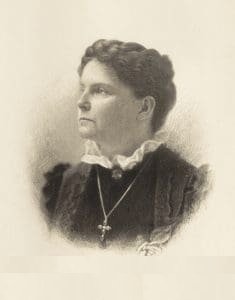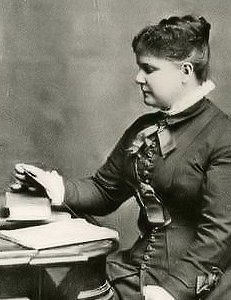Introduction
Born: June 29, 1835, Portsmouth, New Hampshire.
Died: August 25, 1894, Appledore Island, Maine.
Buried: Laighton Cemetery, Kittery, Maine.


Born: June 29, 1835, Portsmouth, New Hampshire.
Died: August 25, 1894, Appledore Island, Maine.
Buried: Laighton Cemetery, Kittery, Maine.


Celia was the daughter of lighthouse keeper Thomas Laighton, and wife of Levi Thaxter (married September 13, 1851).
She is remembered primarily as a poet. Much of her work appeared in periodicals, including the Atlantic Monthly, Century, Harper’s, Independent, New England Magazine, Scribner’s, Our Young Folks and St. Nicholas.
Land-Locked, her first published poem, was printed in the Atlantic Monthly in 1861. Her other works include:
The winter night shuts swiftly down.
Within his little humble room
Martin, the good old shoemaker,
Sits musing in the gathering gloom.
His tiny lamp from off its hook
He takes, and lights its friendly beam.
Reaches for his beloved book
And reads it by the flickering gleam.
Long pores he o’er the sacred page.
At last he lifts his shaggy head.
If unto me the Master came,
he said;
How should I welcome Him?
Should I be like the Pharisee,
With selfish thoughts filled to the brim,
Or like the sorrowing sinner,—she
Who weeping ministered to Him?
He laid his head upon his arms,
And while he thought, upon him crept
Slumber so gentle and so soft
He did not realize he slept.
Martin!
he heard a low voice call.
He started, looked toward the door:
No one was there. He dozed again.
Martin!
he heard it call once more.
Martin, tomorrow I will come.
Look out upon the street for me.
He rose, and slowly rubbed his eyes,
And gazed about him drowsily.
I dreamed,
he said, and went to rest.
Waking betimes with morning light,
He wondered, Were they but a dream,
The words I seemed to hear last night?
Then, working by his window low,
He watched the passers to and fro.
Poor Stephen, feeble, bent and old,
Was shoveling away the snow;
Martin at last laughed at himself
For watching all so eagerly.
“What fool am I! What look I for?
Think I the Master’s face to see?
I must be going daft, indeed!
He turned him to his work once more,
And stitched awhile, but presently found
He was watching as before.
Old Stephen leaned against the wall;
Weary and out of breath was he.
Come in, friend,
Martin cried, Come, rest
And warm yourself, and have some tea.
May Christ reward you!
Stephen said,
Rejoicing in the welcome heat;
I was so tired!
Sit,
Martin begged,
Be comforted and drink and eat.
But even while his grateful guest
Refreshed His chilled and toil-worn frame
Did Martin’s eyes still strive to scan
Each passing form that went and came.
Are you expecting somebody?
Old Stephen asked. And Martin told,
Though half ashamed, His last night’s dream.
Truly, I am not quite so bold
As to expect a thing like that,
He said, yet, somehow, still I look!
With that from off its shelf he took
His worn and precious Holy Book.
Yesterday I was reading here,
So then he talked
How among simple folk He walked
Of old, and taught them. Do you know
About it? No?
With joy to Stephen. Jesus said,
The kind, the generous, the poor.
Blessed are they, the humble souls,
To be exalted evermore.
With tears of gladness in his eyes
Poor Stephen rose and went his way.
His soul and body comforted;
And quietly passed on the day,
Till Martin from his window saw
A woman shivering in the cold,
Trying to shield her little babe
With her thin garment worn and old.
He called her in and fed her, too,
And while she ate he did his best
To make the tiny baby smile,
That she might have a little rest;
Now may Christ bless you, sir!
she cried
When warmed and cheered
She would have gone;
He took his old cloak from the wall.
’Twill keep the cold out. Put it on.
She wept. Christ led you to look out
said she.
And pity wretched me,
Martin replied, Indeed He did!
And told his story earnestly,
How the low voice said, I will come,
And he had watched the livelong day.
All things are possible,
she said,
And then she, also, went her way.
Once more he sat him down to work,
And on the passers-by to look,
Till the night fell, and then again
He lit his lamp and took his book.
Another happy hour was spent,
When all at once he seemed to hear
A rustling sound behind his chair;
He listened, without thought of fear.
He peered about. Did something move
In yonder corner dim and dark?
Was that a voice that spoke his name?
Did you not know me, Martin?
Hark!
cried Martin.
Who spoke?It is I,
Replied the Voice, and Stephen stepped
Forth from the dusk and smiled at him.
And Martin’s heart within him leapt!
Then like a cloud was Stephen gone,
And once again did Martin hear
That heavenly Voice. And this is I,
Sounded in tones divinely clear.
From out the darkness softly came
The woman with the little child,
Gazing at him with gentle eyes,
And, as she vanished, sweetly smiled.
Then Martin thrilled with solemn joy.
Upon the sacred page read he:
Hungry was I, ye gave me meat;
Thirsty, and ye gave drink to me;
A stranger I, ye took me in,
And as unto the lowliest one
Of these my brethren, e’en the least,
Ye did it, unto Me ’twas done.
And Martin understood at last
It was no vision born of sleep.
And all his soul in prayer and praise
Filled with a rapture still and deep.
He had not been deceived. It was
No fancy of the twilight dim.
But glorious truth! The Master came,
And he had ministered to Him.
Celia Laighton Thatcher (1835–1894)